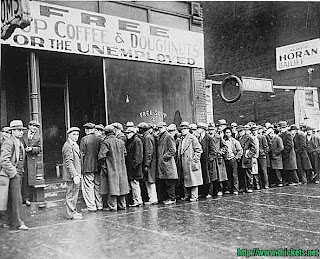89. Hoover's dilemma was that, as a humanitarian, he detested the misery and poverty around him. However, since he was also an individualist who believed in free enterprise, he cowered at the thought of government handouts, fearing that they would destroy the nation's morale.
90. As the depression deepened and relief by local government agencies broke down, Hoover was finally forced to accept the new proposition that the welfare of the people in a nationwide crisis is a direct concern of the national government. He decided to assist the railroads, banks, and rural credit corporations, thinking that financial health would trickle down from the top of the economic pyramid.
91. Some of the criticism of Hoover was unfair because his efforts probably prevented an even more serious collapse. His policies also paved the road for Franklin Roosevelt's New Deal.






































